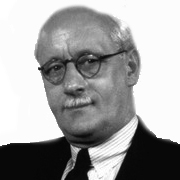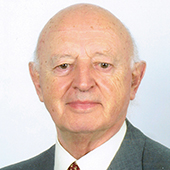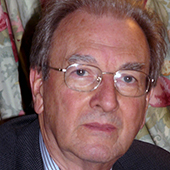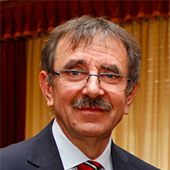Former Secretaries General of the AIDLR
All of our former Secretaries General to the foundation until now
Jean NUSSBAUM (1946-1952)
FOUNDER PRESIDENT OF THE AIDLR
Secretary-General from 1946 to 1966

«FOUR PERSPECTIVES ON RELIGIOUS LIBERTY»
Jean Nussbaum, the founder of the Association, was the first Secretary General. He had four perspectives on Religious Liberty:
1. Perspective on a free country
The struggle for freedom has now affected the entire world and the salvation of our civilization depends upon its outcome. But what is a free country? The different responses and more or less tendentious interpretations abound. Is there yet a “touchstone” that indisputably makes it possible to judge? Most certainly and here it is: A free country is undoubtedly one where a citizen may think as he pleases, where he may believe or not believe, one where religious freedom is sound and without official limitations. Religious freedom exists only in the free world and the first indication of a social or political oppression for citizens begins with a restriction of their right to worship at their discretion or for its existence to be denied.
2. Perspective of joining on vigilance of freedom
Believers or unbelievers, Protestants or Catholics, Christians, Jews or Muslims, philosophers, agnostics or spiritualists find themselves fraternally joined within its ranks, which are steadily growing. We need, in each country around the world, collaborators and delegates, whatever their political leanings or doctrinal or dogmatic nuances, as long as their hearts and their spirits are above all open and concerned enough to persist. Would you like to join with us? You can either do so simply by showing us your sympathy or by subscribing to our association for which Mrs. Roosevelt has accepted the Honorary Presidency. The hour has come for elite to be on their guard. The salvation of our freedom, build on centuries of relentless struggles and innumerable sacrifices, depends on the vigilance of each and every one…
3. Perspective on creating a climate of tolerance
Tolerance is in danger. Is not out very reason for existing to defend and cry out, loudly, each time it is attacked? How can we claim to fight fanaticism if we passively assist or even vaguely consent to its universal triumph? We have asked ourselves these questions and with the same amount of anxiety as you. Neither their seriousness nor their urgency has escaped us. But, the only weapons we have available to resolve these matters are spiritual weapons. These are not, thank God, the least effective but they are also not the most obvious. Our first goal is to create a climate of tolerance. We are well aware that tolerance is difficult to practice and we shy away from to very quickly once we give in to passion. We will never fulfill our mission by arranging a crusade of the “tolerants” against the “intolerants”. Fanaticism exists, that is a fact, but it rarely speaks its name. Certainly it is unfortunate that the progress of democracy in the world has not led to the disappearance of the crime of opinion, but it is up to each nation to give itself the law that suits it best.
4. Perspective on political neutrality
We consider it our duty –of tolerance also – to retain strict political neutrality and to never make a hasty or inconsiderate judgement on internal affairs of state. The cause of religious liberty can gain nothing through this inopportune intervention. Those who have to struggle to maintain their faith – but who can nevertheless still hold on to it and pass it on to their children – run the risk of seeing a government that already has the tendency to treat them suspiciously become alarmed upon receiving our criticisms and protests. We know that every work of tolerance is primarily a work of peace and fraternity, and we will do everything in our power never to fail in this sacred duty.
Pierre LANARES
FORMER SECRETARY GENERAL OF THE AIDLR
Secretary-General from 1966 to 1983

«FREEDOM AND RESPONSABILITY»
Man can choose to act according to principles that will favor his fulfilment, such as those presented by God, but he can also choose to have a different attitude by accepting the consequences. A freedom that has no means of expression is no longer a freedom. God gave man the possibility of rejecting him by warning him that all freedom implies responsibility. Freedom without love is a source of confrontations and constraints in religious life as in everyday life.
Caesar, the symbol of political authority, has a limited power, in administrating social relations, a transitory power, up to the establishment of the kingdom of God, and a delegated power. Permanent and priority citizen allegiance must be kept for God for “we must obey God rather than men” (Acts 5:29). If Caesar goes beyond the limits of authority conferred upon him over the human beings in his care, he will engender conflicts between his dominating will and man’s freedom of conscience. Caesar’s existence is part of God’s will for man’s good, but it does not justify the existence of a totalitarian Caesar. Caesar is still responsible before the one who delegated him his power. In fact, religious liberty is not a human right among others. It is the foundation of other liberties. Jesus’ religious liberty is different. It is a right which flows from a duty to act according to one’s conscience. Duty, for which one is responsible before God and abandonment of which could have eternal consequences.
This freedom proclaimed by Jesus is a love relationship with the Creator and with all men to whom the freedom whose respect we ask for ourselves is granted.
Gianfranco ROSSI
FORMER SECRETARY GENERAL OF THE AIDLR
Secretary-General from 1983 to 1995

«DIFFERENT “VIEWS” OF THE WORLD HAVE THE RIGHT TO EXIST»
Every nation, it is true, has the inalienable right to self-determination, to choose and to freely develop its political, social, economic and cultural systems. But no nation or group can assume the right to establish or maintain a political system that does not respect the rights and fundamental freedom of individuals; in other words that refuses to respect the inherent dignity of each member of the human race.
In fact, to guarantee this right to each individual means to acknowledge his right to be himself, to live in harmony with his deepest convictions and his own world view, to thrive in a perspective that goes beyond his life on earth to attain the certainty of an eternal destiny. We can only reinforce the words of Rene Cassin, winner of the Nobel Peace Prize and one of the fathers of the Universal Declaration of Human Rights, when he said: The right to the freedom of thought is the basis and the starting point for all other rights. It is the right to the freedom of conscience that gives the human being his value and his dignity. Different “views of the world” -whether religious or not - should have the right to exist, to express themselves and to be valued in an atmosphere of mutual respect. Religions with a global vision of the human family that preach justice, peace and love amongst men, should play an important role in the building of a pluralistic society that respects human rights.
We must fight vigorously and with almost urgency against religious extremism and strive to the best of our ability to ensure that the right to the freedom of thought, of conscience and religion or conviction is recognised and guaranteed by law in every country, not only in principle but also in all its different manifestations.
Maurice VERFAILLIE
FORMER SECRETARY GENERAL OF THE AIDLR
Secretary-General from 1995 to 2005

«DO NOT MEET INTOLERANCE WITH INTOLERANCE»
In San Francisco, at the end of the Second World War, men and women of good will created the United Nations Organisation and, a few years later in 1949, others gave birth to the Council of Europe; they all had the same primary objectives: to prevent the miseries of war for future generations, to promote the protection of human rights and fundamental freedoms, and to put into practice the tolerance required to live in peace with each other.
The International Association for the Defence of Religious Freedom does not, in principle, defend religious liberty at all costs. It is evident that the society must structure different freedoms for the collective good. Many types of behaviour are reprehensible. Those who harm the freedom of choice in the matter of conscience and religion, like those who violate human dignity, who put in danger the security of men and women, their health and their lives or who overstep the limits of good morals should be punished by the same token. But it is also essential for the functioning of a true democracy that punishments should be based on the same legal foothold as those which apply equally to all: to individuals or communities, to traditional churches, both old and new, to old or new spiritual communities, both mainstream and minorities.
Karel NOWAK
FORMER SECRETARY GENERAL OF THE AIDLR
Secretary-General from 2005 to 2011

«RELIGIOUS EXTREMISM AND FANATICISM ARE DETRIMENTAL TOWARDS RELIGIOUS LIBERTY»
It seems that religious fanaticism and religious liberty are two phenomenal that create tensions and which, to some extent, are paradoxical. Extremism, and more especially religious extremism, has a tendency to be an obstacle for religious freedom. It often creates legal restrictions and, in some cases, provides the authorities with a pretext for limiting religious liberty. Bur what is an extremist? What is a fanatic? What is a fundamentalist? “Extremism” and “fanaticism” are generally defined as a deviation from a commonly accepted behavioural norm that varies according to the time, place or culture. Whatever the definition, it appears that the fanatic displays very strict standards and displays very little tolerance for ideas or opinions contrary to his own. History has shown us that religious extremism and fanaticism of any nature are hostile and detrimental towards religious liberty. Religious groups that have extremist tendencies display very little tolerance towards other religions or other forms of devotion.
There are governments who, in order to attempt to battle against religious extremism, restrict religious liberty to all. I will quote a personal remark by Nariman Gasimoglu, a scholar originating from Azerbaijan, a translator of the Koran, former research associate at Georgetown University (US): “The Islamist Religious groups […], which do not yet benefit from widespread support, have been strengthened by repression, whereas the moderate Muslims, the Protestants and the Jehovah Witnesses have suffered.
The best – perhaps the only – method of countering religious extremism is to open up society to religious liberty for everyone, to democracy and free debate, including even Islamist groups. It is the only means to deprive Islamic extremism of its influence, by demonstrating the reality of what extremism in power could mean. Religious liberty favours democracy, and democracy favours religious liberty. The more we allow people the freedom to practise their religion, the more we liberate society from the problems of religious extremism. Freedom is a form of remedy for social problems such as extremism.”
Dr. Liviu OLTEANU
FORMER SECRETARY GENERAL OF THE AIDLR
Secretary-General from 2011 to 2021

«THE NEED FOR NEW APPROACHES ON RESPECT FOR DIFFERENCES»
The history of religious freedom in the world is of great interest. This is the story of the ups and downs of freedom, a history characterized by intolerance, discrimination or persecution, as well as hopes and challenges, struggles and victories. Our world is a complex and polarized one, with trends, contrasts, insecurity and crisis. It is undeniable that religious liberty is confronted with new and unprecedented challenges due to the hatred, increasing the violence and terrorism in the name of religion, and aggressive secularism, as well as an important redefinition of the major social institutions.
Why so many people suffered and are still suffering persecution, discrimination, intolerance and death? There are many reasons, but one is due to lack of acceptance that as human being, we are different and we have differences. For that we need to have new approaches on respect for differences.
1. Respect for differences begins with acknowledging the rights, dignity and perspectives of everyone in a thoughtful manner and then by treating others as one would like to be treated. Practically, this is Jesus’ principle, the golden rule of the Bible: “And as you wish that others would do to you, do so to them.
2. It would be wise to look forward and reflect on how to live wisely and treat or understand people, how we look to religions, beliefs, cultures, and try to understand why it is so important to have a respect for others’ differences.
3. We need to learn about other cultures, religions, beliefs, customs and traditions; this will establish and maintain harmony in our relationships and peace in the world.
Consequently, I believe that governments, diplomats, religious leaders, academia and non-governmental organizations can effectively work together at international, regional and national levels to promote peace and security, tolerance and respect for diversity, religion or belief and always defending the human dignity and the principle of freedom of religion for all people.
To what extent is religious freedom distinctive and necessary in our society today?
Religious Liberty is a cornerstone of freedom for all people. For it, the AIDLR “doesn’t represent any particular church or political party” and, do not defend one religion, church or belief, but defend and want to protect a principle: the Principle of religious liberty for ALL people.

«FOUR PERSPECTIVES ON RELIGIOUS LIBERTY»
Jean Nussbaum, the founder of the Association, was the first Secretary General. He had four perspectives on Religious Liberty: 1. Perspective on a free country The struggle for freedom has now affected the entire world and the salvation of our civilization depends upon its outcome. But what is a free country? The different responses and more or less tendentious interpretations abound. Is there yet a “touchstone” that indisputably makes it possible to judge? Most certainly and here it is: A free country is undoubtedly one where a citizen may think as he pleases, where he may believe or not believe, one where religious freedom is sound and without official limitations. Religious freedom exists only in the free world and the first indication of a social or political oppression for citizens begins with a restriction of their right to worship at their discretion or for its existence to be denied.
2. Perspective of joining on vigilance of freedom Believers or unbelievers, Protestants or Catholics, Christians, Jews or Muslims, philosophers, agnostics or spiritualists find themselves fraternally joined within its ranks, which are steadily growing. We need, in each country around the world, collaborators and delegates, whatever their political leanings or doctrinal or dogmatic nuances, as long as their hearts and their spirits are above all open and concerned enough to persist. Would you like to join with us? You can either do so simply by showing us your sympathy or by subscribing to our association for which Mrs. Roosevelt has accepted the Honorary Presidency. The hour has come for elite to be on their guard. The salvation of our freedom, build on centuries of relentless struggles and innumerable sacrifices, depends on the vigilance of each and every one…
3. Perspective on creating a climate of tolerance Tolerance is in danger. Is not out very reason for existing to defend and cry out, loudly, each time it is attacked? How can we claim to fight fanaticism if we passively assist or even vaguely consent to its universal triumph? We have asked ourselves these questions and with the same amount of anxiety as you. Neither their seriousness nor their urgency has escaped us. But, the only weapons we have available to resolve these matters are spiritual weapons. These are not, thank God, the least effective but they are also not the most obvious. Our first goal is to create a climate of tolerance. We are well aware that tolerance is difficult to practice and we shy away from to very quickly once we give in to passion. We will never fulfill our mission by arranging a crusade of the “tolerants” against the “intolerants”. Fanaticism exists, that is a fact, but it rarely speaks its name. Certainly it is unfortunate that the progress of democracy in the world has not led to the disappearance of the crime of opinion, but it is up to each nation to give itself the law that suits it best.
4. Perspective on political neutrality We consider it our duty –of tolerance also – to retain strict political neutrality and to never make a hasty or inconsiderate judgement on internal affairs of state. The cause of religious liberty can gain nothing through this inopportune intervention. Those who have to struggle to maintain their faith – but who can nevertheless still hold on to it and pass it on to their children – run the risk of seeing a government that already has the tendency to treat them suspiciously become alarmed upon receiving our criticisms and protests. We know that every work of tolerance is primarily a work of peace and fraternity, and we will do everything in our power never to fail in this sacred duty.
Pierre LANARES
FORMER SECRETARY GENERAL OF THE AIDLR
Secretary-General from 1966 to 1983

«FREEDOM AND RESPONSABILITY»
Man can choose to act according to principles that will favor his fulfilment, such as those presented by God, but he can also choose to have a different attitude by accepting the consequences. A freedom that has no means of expression is no longer a freedom. God gave man the possibility of rejecting him by warning him that all freedom implies responsibility. Freedom without love is a source of confrontations and constraints in religious life as in everyday life.
Caesar, the symbol of political authority, has a limited power, in administrating social relations, a transitory power, up to the establishment of the kingdom of God, and a delegated power. Permanent and priority citizen allegiance must be kept for God for “we must obey God rather than men” (Acts 5:29). If Caesar goes beyond the limits of authority conferred upon him over the human beings in his care, he will engender conflicts between his dominating will and man’s freedom of conscience. Caesar’s existence is part of God’s will for man’s good, but it does not justify the existence of a totalitarian Caesar. Caesar is still responsible before the one who delegated him his power. In fact, religious liberty is not a human right among others. It is the foundation of other liberties. Jesus’ religious liberty is different. It is a right which flows from a duty to act according to one’s conscience. Duty, for which one is responsible before God and abandonment of which could have eternal consequences. This freedom proclaimed by Jesus is a love relationship with the Creator and with all men to whom the freedom whose respect we ask for ourselves is granted.
Gianfranco ROSSI
FORMER SECRETARY GENERAL OF THE AIDLR
Secretary-General from 1983 to 1995

«DIFFERENT “VIEWS” OF THE WORLD HAVE THE RIGHT TO EXIST»
Every nation, it is true, has the inalienable right to self-determination, to choose and to freely develop its political, social, economic and cultural systems. But no nation or group can assume the right to establish or maintain a political system that does not respect the rights and fundamental freedom of individuals; in other words that refuses to respect the inherent dignity of each member of the human race. In fact, to guarantee this right to each individual means to acknowledge his right to be himself, to live in harmony with his deepest convictions and his own world view, to thrive in a perspective that goes beyond his life on earth to attain the certainty of an eternal destiny. We can only reinforce the words of Rene Cassin, winner of the Nobel Peace Prize and one of the fathers of the Universal Declaration of Human Rights, when he said: The right to the freedom of thought is the basis and the starting point for all other rights. It is the right to the freedom of conscience that gives the human being his value and his dignity. Different “views of the world” -whether religious or not - should have the right to exist, to express themselves and to be valued in an atmosphere of mutual respect. Religions with a global vision of the human family that preach justice, peace and love amongst men, should play an important role in the building of a pluralistic society that respects human rights.
We must fight vigorously and with almost urgency against religious extremism and strive to the best of our ability to ensure that the right to the freedom of thought, of conscience and religion or conviction is recognised and guaranteed by law in every country, not only in principle but also in all its different manifestations.
Maurice VERFAILLIE
FORMER SECRETARY GENERAL OF THE AIDLR
Secretary-General from 1995 to 2005

«DO NOT MEET INTOLERANCE WITH INTOLERANCE»
In San Francisco, at the end of the Second World War, men and women of good will created the United Nations Organisation and, a few years later in 1949, others gave birth to the Council of Europe; they all had the same primary objectives: to prevent the miseries of war for future generations, to promote the protection of human rights and fundamental freedoms, and to put into practice the tolerance required to live in peace with each other.
The International Association for the Defence of Religious Freedom does not, in principle, defend religious liberty at all costs. It is evident that the society must structure different freedoms for the collective good. Many types of behaviour are reprehensible. Those who harm the freedom of choice in the matter of conscience and religion, like those who violate human dignity, who put in danger the security of men and women, their health and their lives or who overstep the limits of good morals should be punished by the same token. But it is also essential for the functioning of a true democracy that punishments should be based on the same legal foothold as those which apply equally to all: to individuals or communities, to traditional churches, both old and new, to old or new spiritual communities, both mainstream and minorities.
Karel NOWAK
FORMER SECRETARY GENERAL OF THE AIDLR
Secretary-General from 2005 to 2011

«RELIGIOUS EXTREMISM AND FANATICISM ARE DETRIMENTAL TOWARDS RELIGIOUS LIBERTY»
It seems that religious fanaticism and religious liberty are two phenomenal that create tensions and which, to some extent, are paradoxical. Extremism, and more especially religious extremism, has a tendency to be an obstacle for religious freedom. It often creates legal restrictions and, in some cases, provides the authorities with a pretext for limiting religious liberty. Bur what is an extremist? What is a fanatic? What is a fundamentalist? “Extremism” and “fanaticism” are generally defined as a deviation from a commonly accepted behavioural norm that varies according to the time, place or culture. Whatever the definition, it appears that the fanatic displays very strict standards and displays very little tolerance for ideas or opinions contrary to his own. History has shown us that religious extremism and fanaticism of any nature are hostile and detrimental towards religious liberty. Religious groups that have extremist tendencies display very little tolerance towards other religions or other forms of devotion.
There are governments who, in order to attempt to battle against religious extremism, restrict religious liberty to all. I will quote a personal remark by Nariman Gasimoglu, a scholar originating from Azerbaijan, a translator of the Koran, former research associate at Georgetown University (US): “The Islamist Religious groups […], which do not yet benefit from widespread support, have been strengthened by repression, whereas the moderate Muslims, the Protestants and the Jehovah Witnesses have suffered.
The best – perhaps the only – method of countering religious extremism is to open up society to religious liberty for everyone, to democracy and free debate, including even Islamist groups. It is the only means to deprive Islamic extremism of its influence, by demonstrating the reality of what extremism in power could mean. Religious liberty favours democracy, and democracy favours religious liberty. The more we allow people the freedom to practise their religion, the more we liberate society from the problems of religious extremism. Freedom is a form of remedy for social problems such as extremism.”
Dr. Liviu OLTEANU
FORMER SECRETARY GENERAL OF THE AIDLR
Secretary-General from 2011 to 2021

«THE NEED FOR NEW APPROACHES ON RESPECT FOR DIFFERENCES»
The history of religious freedom in the world is of great interest. This is the story of the ups and downs of freedom, a history characterized by intolerance, discrimination or persecution, as well as hopes and challenges, struggles and victories. Our world is a complex and polarized one, with trends, contrasts, insecurity and crisis. It is undeniable that religious liberty is confronted with new and unprecedented challenges due to the hatred, increasing the violence and terrorism in the name of religion, and aggressive secularism, as well as an important redefinition of the major social institutions.
Why so many people suffered and are still suffering persecution, discrimination, intolerance and death? There are many reasons, but one is due to lack of acceptance that as human being, we are different and we have differences. For that we need to have new approaches on respect for differences.
1. Respect for differences begins with acknowledging the rights, dignity and perspectives of everyone in a thoughtful manner and then by treating others as one would like to be treated. Practically, this is Jesus’ principle, the golden rule of the Bible: “And as you wish that others would do to you, do so to them.
2. It would be wise to look forward and reflect on how to live wisely and treat or understand people, how we look to religions, beliefs, cultures, and try to understand why it is so important to have a respect for others’ differences.
3. We need to learn about other cultures, religions, beliefs, customs and traditions; this will establish and maintain harmony in our relationships and peace in the world.
Consequently, I believe that governments, diplomats, religious leaders, academia and non-governmental organizations can effectively work together at international, regional and national levels to promote peace and security, tolerance and respect for diversity, religion or belief and always defending the human dignity and the principle of freedom of religion for all people.
To what extent is religious freedom distinctive and necessary in our society today?
Religious Liberty is a cornerstone of freedom for all people. For it, the AIDLR “doesn’t represent any particular church or political party” and, do not defend one religion, church or belief, but defend and want to protect a principle: the Principle of religious liberty for ALL people.